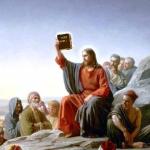Dr. Andre E. Johnson, the Dr. James L Netters Professor of Rhetoric & Religion and African American Studies at Memphis Theological Seminary, will offer a new class for the fall term titled: “Theologian in Chief: The President as Pastor, Prophet and Priest.” He will teach the class on Monday nights from 5:30pm-8:30pm. The class will also coincide with the 2012 presidential election in which religion, religious rhetoric and rhetorical constructions of faith figures to play a prominent role. The course description reads:
A bedrock principle in our democracy is the separation of church and state. Many attribute Thomas Jefferson with the phrase “separation of church and state.” In his letter to the Danbury Baptist Association in 1802 he wrote, “I contemplate with sovereign reverence that act of the whole American people which declared that their legislature should make no law respecting an establishment of religion, or prohibiting the free exercise thereof, thus building a wall of separation between church and state.” However, despite the impenetrable wall of separation, religion has always played a role in our politics since the founding of the country—and no politician has shaped the religious/political culture in American politics than the President of the United States.
Despite claiming while candidates that they were not running for “pastor” or “theologian” in chief, the American public expects the president to be a person of faith and the country expects the president to talk about and demonstrate the faith. The public expects the president to offer moral guidance and faithfully lead the nation. Moreover, when the nation needs absolution from perceived sins, the American people expect the president to offer words of forgiveness. When the country experiences tragedy, many expect the president to find the right words to say to reassure and comfort. In many ways, the president acts as a pastor, priest and prophet.
In this class, by engaging in a close textual analysis of speeches, writings and other forms of communication, we examine presidential religious discourse/rhetoric. We examine how presidential rhetoric empowers and uplifts its audiences, as well as divides and separates as political strategy. We will also examine how presidents adopt the religious personas of pastor, priest, and prophet to get their messages across to their audiences. We also will study what I call the “religious and faithful veracity” of the messages from presidents and candidates. Finally, at the end of this class, the students should be able to not only analyze messages, but also place them within a framework that will help church leaders when discussing political issues with their own congregations.
Dr Andre E. Johnson also is the Editor of the Rhetoric Race and Religion blog
















